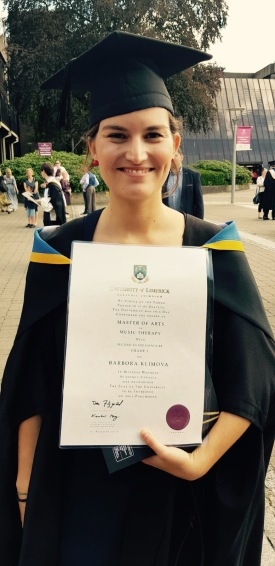
What made you study at UL?
I am from Czech Republic where I studied classical music and special education. I became interested in music therapy during my work experience as an ASN in preschool for children with autistic spectrum disorder. At that time there was no possibility to get a degree in music therapy in my country so I have looked around Europe for options. Ireland was always close to my heart – it is an English speaking country with lovely nature and great people – and the only place in Ireland, where you can get a professional qualification in music therapy is at the University of Limerick in The Irish World Academy of Music and Dance.
What did you learn on the course?
The Music Therapy master’s is a two year course. It is hard to describe in a few lines what I have learned during that time. From academic research to practical implementation of music therapy programme, the course offers a huge learning scope.
The course is designed to give you an insight into up to date research and knowledge of contemporary approaches to wellbeing and health as well as therapeutic skills to promote these. Over the period of four semesters, we were encouraged to explore our musicianship, to learn new musical techniques and to use them in therapeutic/clinical settings with clients.
What is unique about the programme?
Part of the programme is also focused on therapeutic training and personal growth. Students engage in individual psychotherapy and group therapy. The course is designed to challenge students in accurate and constructive self – reflection, which is absolutely necessary for future work of a therapist.
Can you take us through a typical week on the MA programme?
The week started with 2 days of lectures at UL followed up by a day or two of placement. The content of the modules was often designed to overlap with our practical experiences on placements, which was very useful. The lecturers were experienced professionals with different academic training and from various clinical settings. There was always a relaxed atmosphere and sense of equality in the classroom with enough time for discussion or various questions.
Can you describe how you found your clinical placement experience and the main things you learned whilst on placement?
For me personally, the clinical placement was at the core of my two years at UL. It is during placements when all the academic knowledge and learned skills are shaped into a real music therapy practice. Having the opportunity to work in clinical settings and observe senior music therapists was one of the greatest learning opportunities in my academic journey. An important part of the placement is regular supervision with experienced music therapist. Supervision offers a safe space for the student to discuss her/his experience of the placement, with all the fears, doubts or questions which may arise. I have always valued my supervision time, and I have always felt heard and supported during my clinical work experience.
Can you tell us about your own personal experience of the course, the benefits/challenges etc?
As a non-native English speaker I have struggled with the language of academic research. However with support from my peers and the course lecturers it became less of an issue over time.
One of the challenging aspects of the course for me was undergoing psychotherapy while studying, working and preparing for weekly placements. Although it was very intense period of the masters, looking back now I feel it was also transformative and life changing experience.
Would you recommend the MA to others?
Yes, absolutely, it is a fantastic programme.
What do you plan to do/have done post-graduation?
After having a well-deserved break, I am now in a process of establishing myself as a music therapist in the area where I live. My plan is to stay connected with the professional music therapy field as well as with my former classmates, who have now become my colleagues.
